If there’s one thing we’ve been frequently reminded about these last few months, it’s the importance of clean hands in minimising the spread of germs and keeping ourselves and those around us safe. But when there’s no running water and soap to be found – can hand sanitisers really step in and do the job without leaving our hands red and raw?
According to the Centre for Disease Control and Prevention (an American public health institute based in Atlanta), while soap and water remain the best way in which to guarantee germs have been properly eliminated from the surface of your skin, hand sanitisers can work too. In order to be a suitable substitute though, they need to contain ingredients with recognised pathogen killing capabilities and be used correctly. Unlike soaps – which are classified as detergents and will foam to help wash away microbes that could lead to infections – sanitisers are disinfectants. This means that although sanitisers can kill germs, they won’t actually remove them from your hands – which is why the right ingredients are so important in increasing your chances of destroying any disease carrying germs.
The most effective hand sanitisers should contain…
For most sanitisers on the market, the key agent is alcohol, although there are other options. As Nic Taylor, founder of skincare brand 47Skin, states, “Alcohol can dry out hands, leading to irritation or dermatitis”. Working for two years, his team developed Silver Spray, an alcohol-free sanitiser that can kill germs in the same way alcohol-based equivalents can. Launched just as Covid-19 became a global pandemic, the sanitiser was put through a series of verified lab tests, returning clinically proven results that it can wipe out microbes in just 60 seconds.
A “truly amazing” find, Nic credits the formula’s success to the brand’s patented blend of silver and Chitoderm, which work together to break down and destroy germs – without causing the skin to lose hydration. In fact, “Chitoderm has the added benefit of creating a lattice-like structure, supporting cells to naturally regenerate and protect the skin,” says Nic. This means Silver Spray “Sanitises whilst being kind to hands”, making it particularly great for those with sensitive or dry skin.
If going down the alcohol-based sanitiser route, there are some crucial ingredients to consider, so that your chosen product will safeguard against germs without stripping hands of moisture. To start with, formulas need to contain either ethanol or isopropyl (sometimes referred to as propanol or isopropanol, and commonly known as rubbing alcohol). Both types are regularly found in disinfectants because they are highly water soluble (improving penetration) and can successfully demolish the cell walls of microbes to protect against the spread of infection.
Of course, the percentage of alcohol found in sanitisers is equally important. Based on findings from various studies, the general consensus amongst healthcare professionals is that for sanitisers to succeed in killing germs, they need to contain between 60-90% alcohol. Concentrations which exceed 60% alcohol have been found to work quicker as well as eradicate a wider range of bacteria and viruses. Interestingly, the efficiency of alcohol appears to plateau at around 90%, which may in part be due to the reduced amount of water in the solution; this means finding the perfect balance is vital in maximising efficiency.
Although alcohol isn’t toxic, as noted by Nic and increasingly acknowledged within the skincare realm, it can be drying and may cause redness and inflammation, especially with repeated use. To combat this, always look out for sanitisers that contain soothing ingredients such as aloe vera or conditioning essential oils, which will help to both protect and nourish hands.
How to use hand sanitisers correctly
As with soap and water, it’s recommended that sanitisers are thoroughly worked into hands for around 20 seconds. Fingers and both palms need to be covered with the solution or gel and the product rubbed in until it’s been fully absorbed. Wiping off any residual sanitiser after application may reduce its effectiveness.
We have picked the following for their blend of bacteria-killing properties and hydrating formulas:
Subtle Energies Active Hand Sanitiser, £30/ 50ml
Subtle Energies was established on Ayurvedic principles and its Active hand sanitiser stays true to the brand’s holistic approach to wellbeing. Designed with 65% plant-based ethanol, which is kinder to skin than its chemical counterparts, the sanitiser is also enriched with essential oils like Kunzea, Tulasi, clove and black pepper. Known for their natural antibacterial and purifying benefits, they help make this a germ-killing sanitiser that won’t deprive hands of moisture.

Kloris No Rinse Hand Sanitiser
A solid 60% alcohol content means the Kloris No Rinse hand sanitiser ticks the box for solutions that work, but thanks to added ingredients of aloe vera and 1000mg of CBD, using it won’t result in rough hands. Studies have confirmed that CBD strengthens the skin’s natural barriers while working with its receptors to reduce inflammation caused by harsh chemicals. Suffused with fresh bergamot for a calming scent, this will keep hands clean and soothed.

47Skin Silver Spray Hand Sanitiser Spray
The alcohol-free Silver Spray from 47Skin defends against microbes without damaging skin. The brand’s unique combination of silver and Chitoderm is acclaimed for its conditioning properties and, even better, the sanitiser formulation has been found to generate an anti-bacterial, anti-viral film which can continue killing germs for hours. “Gentle on the skin and offering long-lasting protection,” Nic calls it a “double whammy of benefits”.

Margaret Dabbs Hand Cleansing Gel
Fragranced with zesty mandarin and floral notes of geranium, the Margaret Dabbs’ Hand Cleansing Gel not only smells great, it also contains 65% alcohol, ensuring its success in destroying microbes. Other key ingredients in the antibacterial gel include hempseed oil – an anti-inflammatory that’s ideal for locking in hydration – and white water lily, which conditions and moisturises for softly cleansed hands.

Aesop Resurrection Rinse-Free Hand Wash
With a 58-62% alcohol-based formula, the Resurrection Rinse-Free Hand Wash from Aesop is a good alternative for when you’re on-the-go and have no access to running water. The sanitiser is enhanced with rosemary and cedar atlas which help to calm irritated skin and mandarin (a natural antiseptic) that supports moisture retention. The result is a non-drying sanitiser with a pleasingly refreshing aroma.




